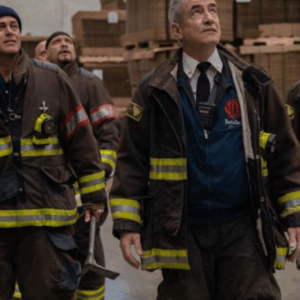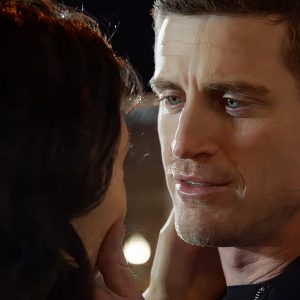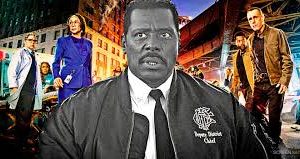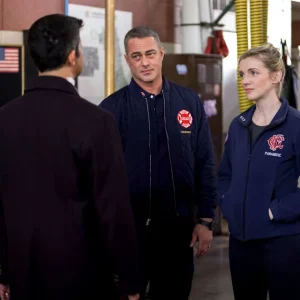A storm is returning to Firehouse 51, and it wears the face of a legend.
Eamonn Walker is back.
After nearly a year away from Chicago Fire, Walker steps once more into the battle-scarred boots of Wallace Boden—the towering, steel-willed Deputy Commissioner whose presence alone can shift the air in any room. But his return isn’t one of triumph or nostalgia. No, this is not a warm homecoming. It’s a reckoning.
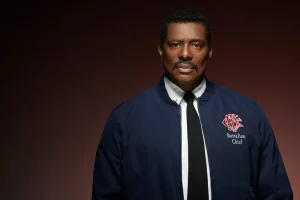
Walker’s reappearance in this week’s episode comes wrapped in tension and tragedy. As he told PEOPLE, “Unfortunately, it’s a terrible situation.” Firehouse 51, it seems, made a devastating mistake—one that could cost a man his life. A blaze they thought was long extinguished reignites in the worst way imaginable. An alarm screams through the smoke, only for them to realize: they left someone behind.
Now that forgotten soul lies in a hospital bed, hovering between life and death. And as the team reels from the guilt, Boden walks through the firehouse doors not as a friend—but as the man sent to determine whose head should roll.
An investigation launches almost immediately. Blame hangs in the air like smoke. Boden is not here to reminisce. He’s here to ask one question with deadly seriousness: “Whose fault is this?”
And he makes no promises of mercy.
“It’s not just that we might lose someone in the hospital,” Walker warns. “We might lose someone because I fire them.”
It’s a gut punch, the kind only Boden can deliver with such quiet authority. His love for his team has always been deep—but so is his dedication to the chain of command, and the weight of responsibility. This isn’t personal. This is life and death. And if someone’s mistake put another firefighter in a coma? No amount of history will protect them.
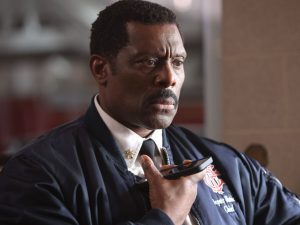
But behind the hard edges of Boden’s return is something softer—a man stepping back into a place that once felt like home. And it hits him hard.
The return to Firehouse 51 is deeply emotional for Walker, who hadn’t filmed on the set since his departure the previous May. “The welcoming was so warm,” he said. “There were tears when I arrived and tears when I left.” His words echo the same sentiment fans have felt since he exited the series—Boden’s absence is more than noticeable. It’s felt in every empty corner.
Walker described moments of sensory overload, unexpected emotional flashbacks on set. One scene, in particular, broke through the lines of the script. It wasn’t planned, but it was honest. He turned to Chief Dom Pascal (played by Dermot Mulroney) and ad-libbed, “Your office, let’s go.” A simple line, but charged with the weight of legacy, grief, and change. This was once his world. Now he’s merely passing through it.
Still, the fire hasn’t left him.
When asked if he’d consider more episodes in Season 14, Walker didn’t hesitate. “If they write it, I’m there,” he said. “This episode… it was unlike anything I’d ever read in all my years on the show.” That passion, that respect for the writing, still burns bright. The invitation to return wasn’t taken lightly. The script needed to matter. And in this case—it did.
Walker admitted that he hadn’t been watching Chicago Fire regularly since his exit. “It’s painful,” he confessed. “I don’t want to go down memory lane every time I turn it on.” And perhaps that distance served him well. Returning with fresh eyes allowed him to step back into Boden’s shoes without the baggage of how the firehouse has changed in his absence. This time, all that matters is the crisis in front of him.
Someone’s life is hanging in the balance. And someone’s job might be, too.
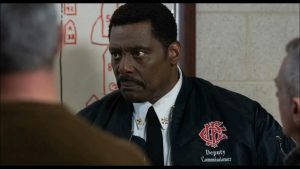
Walker also reflected on the growth of other characters since Boden’s departure, particularly Mouch (Christian Stolte) and Hermann (David Eigenberg). “It’s wonderful,” he said, to see them taking the advice Boden once gave, stepping into leadership, even if they’re only just beginning to understand the burden it carries. “He didn’t smile much,” Walker noted of his own character. “Because when you have the weight of someone’s life in your hand—it’s heavy.”
It’s a chilling reminder of what being a leader in the firehouse really means. And that weight hasn’t gotten any lighter.
Despite the episode’s intensity, there were moments of camaraderie. Walker and Mulroney (Pascal) shared mutual admiration, although the tight, high-stakes filming schedule left little time for casual chats. The scenes were relentless—every interaction between Boden and the officers crackled with pressure. There was no room for nostalgia. Only answers.
As the episode unfolds, viewers will be forced to confront the same question Boden must answer: What happens when a team you built, a family you nurtured, makes a mistake so big it might cost a life?
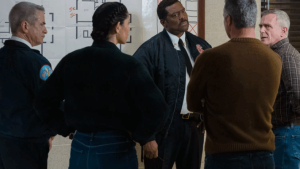
Can the foundation of Firehouse 51 withstand the blow? Or is this the beginning of a new fracture?
One thing is certain: Boden’s presence changes everything.
He is not just a former chief returning for a visit. He is a symbol of everything Chicago Fire has always stood for—duty, honor, and unflinching accountability. And while his return may be temporary, the consequences of it will ripple through the firehouse long after he’s gone.
So buckle up, fans. This isn’t just a reunion. It’s a reckoning.
And when Wallace Boden walks through the doors of Firehouse 51, nobody leaves untouched.
